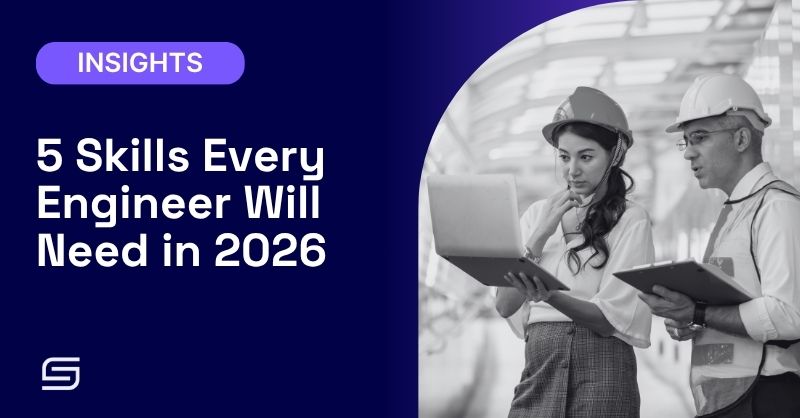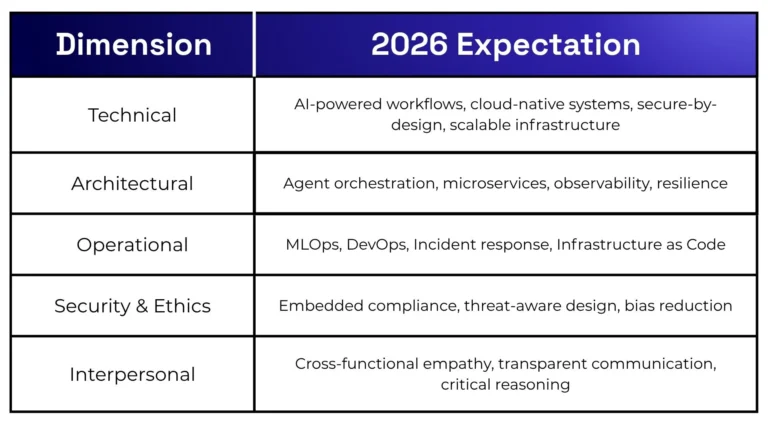5 Skills Every Engineer Will Need in 2026

The engineer of 2026 needs to be a lot more than just a code-slinger in a world where technology changes at an ever-increasing rate. The future needs a hybrid hero—someone who knows a lot about technology and has a lot of strategic vision, curiosity, and empathy for people. This is because of AI assistants, quantum breakthroughs, cloud services that are everywhere, and edge computing.
We at Smoothstack have witnessed how the engineers in high demand nowadays are changing. The ones that will have the biggest long-term effects on their careers have five main skill sets:
- AI/ML & Prompt Mastery
- Agent-Orchestration
- Cloud-Native & DevOps Fluency
- Cybersecurity-Aware Engineering
- Advanced Soft Skills & Ethical Acumen
Let’s explore why each of these is critical, and how you can develop them to stand out in 2026 and beyond.
1. AI/ML & Prompt Mastery
Why it matters
Generative AI is reshaping software development: from code generation and testing to documentation and design. According to Gartner, by 2026, nearly 90% of digital content workflows will leverage generative AI . Yet the real game-changer lies not just in using AI—but in prompting it correctly.
Financial Times reports that prompt engineering is becoming a key corporate competency; firms like JPMorgan now train every newcomer in crafting effective AI prompts . As AI assistants take over repetitive tasks, engineers who can direct AI with nuance and foresight will lead the pack.
How to build this skill
- Practice prompt design: Train AI models in different coding languages and domains.
- Learn MLOps fundamentals: Know how models are built, deployed, monitored—so prompts work reliably in production .
- Stay updated: Follow research on generative models, APIs, bias mitigation—these evolve monthly.
Real-world impact
Engineers adept at prompting won’t be replaced—they’ll be amplified. AI becomes a collaborator generating first drafts of code, automating tests, or summarizing requirements, leaving humans to design solutions with imagination and intent.
2. Agent-Orchestration: Beyond the Bot
Why it matters
Cisco’s Chief Product Officer, Jeetu Patel, calls attention to a seismic shift in engineering roles: rather than writing boilerplate or debug code, engineers will orchestrate AI agents, designing workflows in which multiple AI tools interact toward a unified goal .
Imagine overseeing a suite of AI “agents”—some analyze logs, others generate alerts, others suggest fixes. Your job becomes setting goals, defining handoffs, and monitoring outcomes—a shift toward systems thinking and coordination.
How to build this skill
- Learn workflow automation: Tools like Apache Airflow, Temporal, or bespoke agent frameworks.
- Study orchestration patterns: Sequence, fan-out/fan-in, compensation logic.
- Design for monitoring: Build metrics, logs, health checks into every agent.
Real-world impact
Modern teams need architects of intelligent workflows. When you can design a network of agents that autonomously monitor, correct, and self-document, development velocity multiplies—while reducing cognitive load.
3. Cloud-Native & DevOps Fluency
Why it matters
Almost every enterprise—public or private—is migrating to cloud-first infrastructures. The demand for engineers skilled in cloud-native patterns, microservices, CI/CD, site reliability engineering, and infrastructure-as-code is soaring .
Architectural resilience, elasticity under load, observability, zero-downtime deploys—these aren’t nice-to-haves; they’re the baseline for 2026. Edge computing, serverless, and container orchestration (Kubernetes, AWS ECS) dominate modern deployment stacks.
How to build this skill
- Get certified in AWS/Azure/GCP: But go deeper—deploy real workloads.
- Master IaC: Tools like Terraform, Pulumi, CloudFormation.
- Automate CI/CD: Jenkins, GitHub Actions, GitLab CI with full pipeline automation.
- Monitor in production: Use Prometheus, Grafana, ELK, Datadog to build observability into systems.
Real-world impact
Cloud-native engineers reduce toil, scale services dynamically, and detect anomalies before they cast outages. They write small, testable code—but ship at human pace.
4. Cybersecurity-Aware Engineering
Why it matters
As systems grow richer and more complex, their attack surface grows too. In 2025, cybercrime cost the global economy trillions . Engineers can no longer “hand off security” to another team—they must build it in.
Security engineering isn’t just building firewalls—it’s embedding threat models in every line of code, automating vulnerability scans, object-level encryption, least privilege access, and compliance-as-code.
How to build this skill
- Learn threat modeling: STRIDE, DREAD, and others.
- Embed security tools: SAST, DAST, container scans into CI pipelines.
- Practice secure architecture: Zero Trust, mTLS, IAM, vaults, key rotation.
- Stay informed: Follow OWASP guidelines, CVE databases, cloud provider security bulletins.
Real-world impact
By treating security as a first-class production concern, engineers prevent breaches, ensure data integrity, and reduce compliance costs—a huge value-add for organizations.
5. Soft Skills & Ethical Acumen
Why it matters
According to a recent study, employers in 2025–2026 will prize not only technical fluency, but critical thinking, empathy, curiosity, and ethics . As machines take over predictable workflows, human strengths become the real differentiators.
From interviews to cross-functional design meetings to ethical AI deployment, engineers who can communicate transparently, listen deeply, resolve ambiguity, and reason ethically will elevate team output and user trust.
How to build this skill
- Practice active listening: Don’t just hear—seek to understand context, motivations, constraints.
- Think critically: Ask “why”, challenge assumptions, anticipate edge cases.
- Build empathy: Immerse yourself in user journeys, stakeholder needs, and lived experiences.
- Cultivate ethical reasoning: Reflect on bias, accountability, privacy, and societal impact in your designs.
Real-world impact
Engineers who unite technical ingenuity with emotional intelligence and moral grounding build products that last—and earn respect from peers, stakeholders, and customers alike.
Bringing It All Together: The 2026 Engineer Archetype

If you only excel at code, 2026 will leave you behind. But if you learn to design with AI agents, build with cloud and DevOps, secure with forethought, and connect with empathy, you’ll be indispensable.
How to Prepare Now
At Smoothstack, we push beyond traditional education—believing that engineering is a craft shaped by purposeful practice:
- Self-driven project blitz: Build a microservice that uses an AI agent via AWS Lambda + LangChain + Pinecone.
- Contribute to open source: Fix bugs, add features—and experience real-world CI/CD and security reviews.
- Pair-program regularly: Sharpen communication and collaborative problem-solving.
- Host ‘war rooms’ for hypotheticals: Simulate an incident, model threats, plan rollout—practice ethical reasoning.
- Take cross-disciplinary workshops: From prompts to ethics to cloud certification, build breadth and depth.
Why Employers Will Pay the Premium
Organizations who invest in engineers with these five pillars unlock:
- Speed & agility: AI-assisted development lets engineers deliver weeks faster.
- Scalability & reliability: Cloud-native systems scale horizontally and stay resilient.
- Security & trust: Built-in defense reduces risk and compliance remediation.
- Innovation & empathy: Ethical, human-centered design fosters better user engagement.
- Growth potential: Engineers become leaders, not coders—building products with purpose.
These are not buzzwords, they’re ROI drivers. And engineers who can articulate and deliver this value are changing how tech teams operate.
Conclusion
The future engineer is not defined by a single stack or paradigm—but by systems thinking across intelligence, infrastructure, security, ethics, and empathy. The tools of tomorrow—from AI agents and cloud patterns to secure coding and ethical reason—are the assembly of a new archetype: one built for volatility, complexity, and human impact.
At Smoothstack, we’re not just teaching engineers how to code. We’re preparing them to design with purpose, build with impact, and lead with insight. If you’re ready to rise, begin layering these five essential skills—today.
Let’s Build Your Team
Connect with the Smoothstack team to learn how to close your digital skills gap with a custom-trained team.